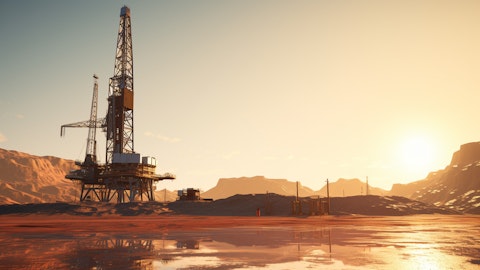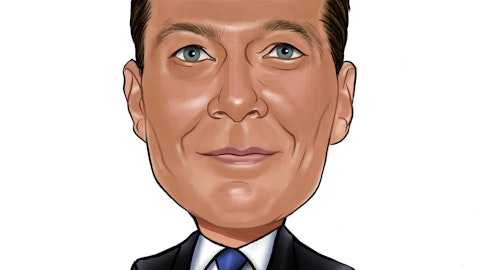Cindy Taylor: No, not at this point in time. It was interesting when we did the recast, kind of margin profile ended up in similar positions. And so we don’t expect incrementals. Obviously, incrementals should go up if we get the top line growth that we’re looking for, but that’s not unique to the mix of businesses. That’s just cost absorption.
Stephen Gengaro: Okay, thanks. And I got dialed in a little late, so I apologize if you addressed this. But when you think about the change in your-full year guide from the prior guidance, is most of that just kind of U.S. land activity related? Or is there anything else in there we should be thinking about?
Cindy Taylor: At this point in time, we obviously have a lower quarter in our Offshore/Manufactured Products business than we expected to have with a little bit of these orders pushed out. And so I’m putting a little downward pressure on Offshore/Manufactured Products. And the key to U.S. land for us is kind of managing through the exposure that we have in the gas plays efficiently, I’ll say, this year given the very low activity levels, but staying prepared for what should be an uplift on those plays as early as 2025. And so controlling cost in the natural gas plays, really, is going to be the game for the next couple of quarters as it relates to U.S. land. But we are proactively doing what we need to do, so it’s not a terrible drag on the overall results.
Stephen Gengaro: Okay. Great. And then maybe just one final one. On the perforating side, there’s been a lot of movements over the last couple of years, I think, just in the competitive landscape, and you have one competitor, I think, who’s trying to sell their business. Can you just speak to the dynamics there? Have you seen any changes there as far as the perforating side is concerned? And what are you seeing there from a pricing perspective?
Cindy Taylor: I’ll be honest. Yes, there is a larger player that is looking to monetize, and there’s actually a couple of smaller competitors looking to monetize. So that could lend itself to a healthier market going forward for the business. We are committed to the business, and we’re committed to delivering the technology it takes to be successful in it. I’ll just kind of generally say that from a competitive landscape, it’s hard for me to say that it’s not getting a little bit or it will be as some of these transactions occur. And I think more important for us specifically is the investment we made last year and the new technology rollout. And importantly, the go-to-market strategy, which has evolved from moving away from wireline companies to E&Ps and back. And we just want to support our customers regardless of where they are in the supply chain. And I think that’s going to benefit us over the longer period of time.
Stephen Gengaro: If I could slip in one more, Cindy, sorry. Does the E&P consolidation and the larger operators appreciation for that technology ultimately help you?
Cindy Taylor: I think it would for sure. I mean, it all comes down to reliability. And in the world we work in, it’s also got to be cost, and we’ve made significant improvements on there. But I think the technology differentiators really play more probably in the international market just because of the reliability factor that is necessary, and there’s not quite as much competition, quite frankly, in international basins. And so those are going to be the key differentiators. And drivers of our success going forward.
Stephen Gengaro: Okay, great. Thank you.
Cindy Taylor: Thanks, Stephen.
Operator: Our next question comes from the line of John Daniel from Daniel Energy Partners. Please ask your question.
John Daniel: Hey, good morning, Cindy and Lloyd.
Cindy Taylor: Hi, John.
Lloyd Hajdik: Hi, John.
John Daniel: You sort of answered my question, it was in response to Stephen’s question, but I’ll maybe rephrase it a little bit. I mean the carnage in nat gas markets is growing and yet the medium to longer-term outlook remains constructive. It’s really just, how do you capitalize on the present disconnect? Because there’s a lot of — as you all know, there’s a lot of small service companies, regional ones, struggling, and those struggles probably intensified as it seem to create opportunities.
Cindy Taylor: Well, I think, yes, they will. But actually, a lot of people are shutting doors, and that just firms up the competitive positioning in the plays. We already work for, particularly in the Northeast, some of the larger players that are active there. We’re doing the multi-well pads as opposed to the lower-tier type activities. So my singular focus right now is trying to mitigate losses and keep our field service technicians employed. And if that means rotating to other plays, and there’ll be some incremental costs there, but it’s better than losing your FSTs and having no profitability at all, right? And so singular focus is on cost management and control and retaining those FSTs through the next three quarters.
John Daniel: Okay. Well, that’s all I had. So thanks for including me.
Cindy Taylor: Thank you, John.
Operator: That concludes our Q&A session. I will now turn the conference back over to Cindy Taylor for closing remarks.
Cindy Taylor: All right. Thank you, Dee, and thanks to all of you for joining our call today. We always appreciate your interest in Oil States and your continued support, not only for us, but for the industry as a whole. I know it’s a very busy period of time, but we’ll catch up with all of you if you choose to give us a call back. So thanks so much.
Operator: Ladies and gentlemen, that concludes today’s call. Thank you all for joining. You may now disconnect.
Follow Oil States International Inc (NYSE:OIS)
Follow Oil States International Inc (NYSE:OIS)
Receive real-time insider trading and news alerts



